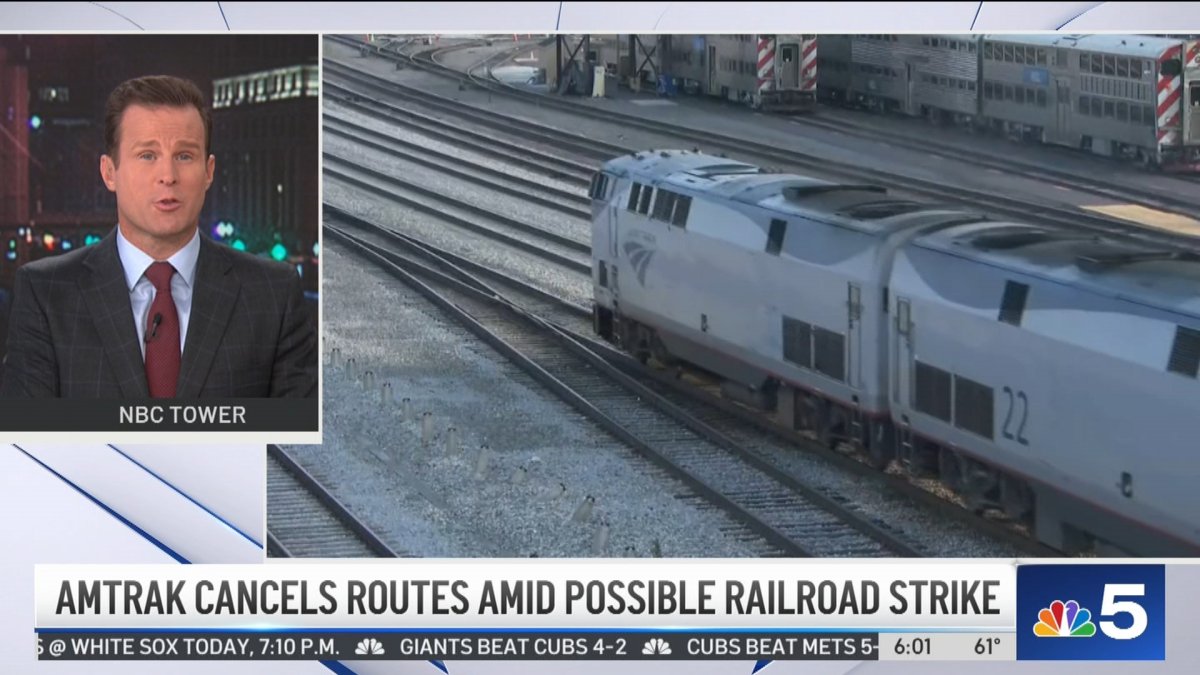
In a move to prevent train passengers from being stranded, Amtrak on Monday said that it would pre-emptively cancel three long-distance train routes as an impending freight rail worker strike threatens to disrupt both train travelers and consumers. Lisa Chavarria has more.
UPDATE: Thursday morning, following a tentative agreement reached by union workers and railroad companies, both Metra and Amtrak said all lines will run as scheduled, and that they were working to restore service to any previous pre-emptive cancelations. Our original story continues below.
In a move to prevent train passengers from being stranded, Amtrak on Monday said that it would pre-emptively cancel three long-distance train routes as an impending freight rail worker strike threatens to disrupt both train travelers and consumers.
According to a report from NBC News, freight workers are threatening to strike as early as Friday for reasons including higher pay, more generous paid leave, and a renegotiation of strict attendance policies that makes it difficult to take time off.
While Amtrak is not part of the dispute, the train operator said in a statement that a rail worker strike "could significantly impact" its passenger service since it operates nearly all of its 21,000 route miles on tracks that are owned, maintained and dispatched by freight railroads.
Feeling out of the loop? We'll catch you up on the Chicago news you need to know. Sign up for the weekly Chicago Catch-Up newsletter here.
According to Amtrak, the affected routes are a portion of the Texas Eagle, along with three long-distance routes that originate in Chicago: California Zephyr, Empire Builder and Southwest Chief.
"These initial adjustments could be followed by impacts to all Long Distance and most State-Supported routes," Amtrak's statement continued.
But train passengers may not be the only ones impacted by a strike.
Due to the volume of products carried and moved by rail, supply chains for various items could be affected. According to the head of the United States Chamber of Commerce, a rail worker strike could further affect economic and supply chain issues by impacting the flow of goods and raise already inflated prices.
"A shutdown of the nation's rail service would have enormous national consequences," the Chamber said on Monday, Reuters reports.
A White House official told The Associated Press that President Joe Biden and members of his Cabinet are in touch with both sides in hopes of preventing a strike, and that a number of trade groups representing railroad shippers are urging lawmakers to be prepared to block a strike.
Last week, coalition of 31 agricultural groups sent a letter to Congress, and the Fertilizer Institute trade group joined the chorus of concerned shippers Saturday because shipments of ammonia and other fertilizers will be delayed.
“Supply chains are already strained and there is currently zero elasticity in rail transportation,” FIT group President and CEO Corey Rosenbusch said. “This situation will get exponentially worse every day there is no resolution.” According to Rosenbusch, more than half of all fertilizer is hauled by railroads.
Additionally, more than 75% of all finished vehicles are taken from factories to dealerships by train, and countless other products move by rail.
The Association of American Railroads estimates shutting down the railroads would cost the economy $2 billion dollars a day.
Metra on Tuesday said in a statement that while it had not pre-emptively canceled routes, a strike could change that -- and busy commuter lines taking passengers to and from the city would be impacted.
"Unfortunately, a potential work stoppage by freight railroad workers, which could possibly begin Friday, Sept. 16, may directly impact Metra’s ability to operate most of its services," the statement said.
"With the exception of the Metra Electric and Rock Island lines, Metra’s nine other lines either use tracks owned by freight railroads, intersect with tracks operated by our freight partners, or are dispatched by freight railroads," the statement continued. "Four of our lines, the BNSF and Union Pacific North, Union Pacific Northwest and Union Pacific West, are owned by and directly operated by freight railroads. If the work stoppage occurs, we expect there will not be service on these lines."
The Associated Press contributed to this report.